- Home
- News
- What’s On
- Activities for Children
- Arts & Crafts
- Autos and Bikes
- Business events
- Car Boot & Auctions
- Charity events
- Churches & Religious
- Comedy
- Dance
- Days out & Local interest
- Education
- Exhibition
- Film
- Gardening & Horticulture
- Health
- Markets & Fairs
- Music
- Nature & Environment
- Spiritual
- Sport
- Talks and Discussions
- Theatre and Drama
- Business
- Local Information
- Jobs
- Deaths
- Charity events
- Contact Us
‘Glorious Phantoms’
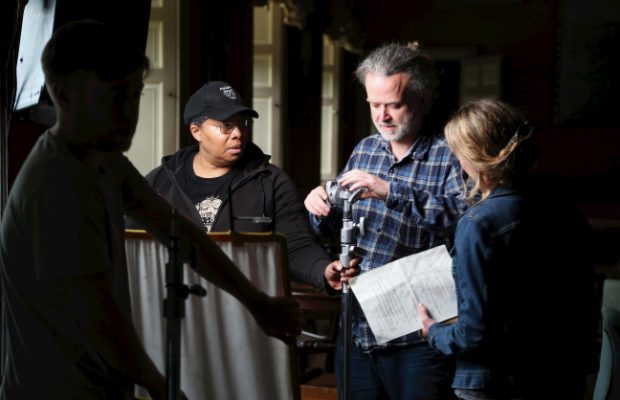
Picture: Jason Lock
Unearthing Passion and Protest at Dunham Massey and Quarry Bank. Saturday 13 July – Sunday 29 September 2019
Dunham Massey and Quarry Bank are exploring the legacy of the Peterloo Massacre 200 years on from this historical milestone through newly commissioned artwork that has been created by artist family Grace Surman and Gary Winters, and their two children Hope and Merrick. Responding to events on 16 August 1819 that led to loss of lives and the injury of hundreds, the work focuses on ideas around protest, rights and responsibilities, freedom and the power to create change both then and now.
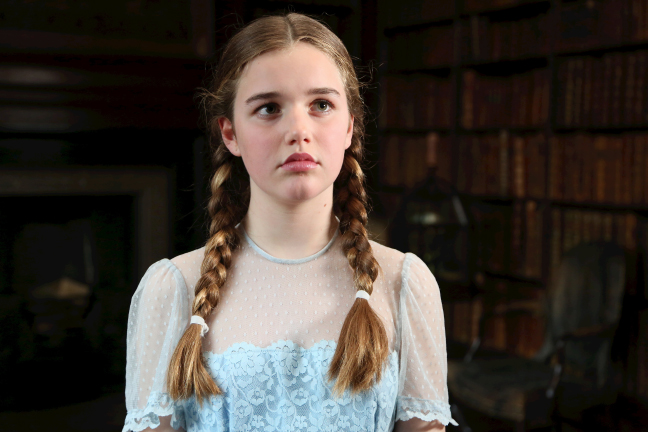
Glorious Phantomstakes the form of two films, created and produced by the family that will be shown simultaneously at Dunham Massey and Quarry Bank. The films are specific to each place, with the project delving into their individual Peterloo stories at a time when there was considerable political unrest. To understand these stories and how events unfolded 200 years ago, Grace, Gary, Hope and Merrick have worked with National Trust volunteers and historian Michala Hulme of Manchester Metropolitan University to research the connections.
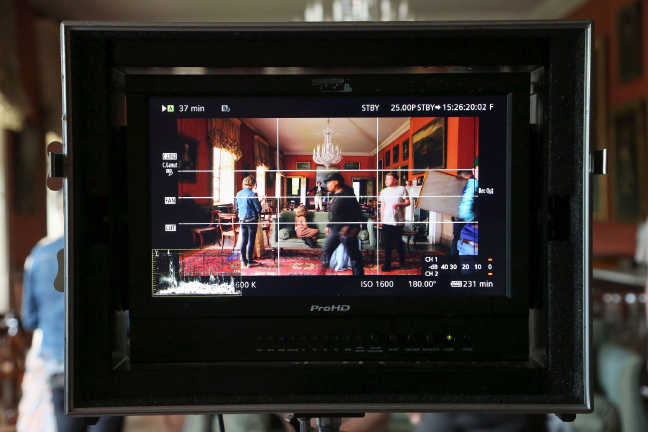
Artist family Grace, Gary, Hope and Merrick, say “Rather than re-tell the Peterloo story from a historical perspective, we wanted to explore the human side of those involved and engender an empathetic reaction to the people and the places connected to them. Grace couldn’t stop reading letters between family members at Dunham Massey. Merrick, who loves to be in nature, climbing trees and getting covered in mud, felt deeply for the children’s very different experiences in both places. Hope was inspired by peaceful protest, and the problems facing democracy today and Gary was drawn to the idea ofa universal call, the rights of the child and celebrating a call for democracy. Taking inspiration from these ideas, we wanted the resulting art installations to hold many “jostling” components; a “mash up” of metaphors drawing the viewer in and showing them something that is both familiar and unpredictable at the same time”.
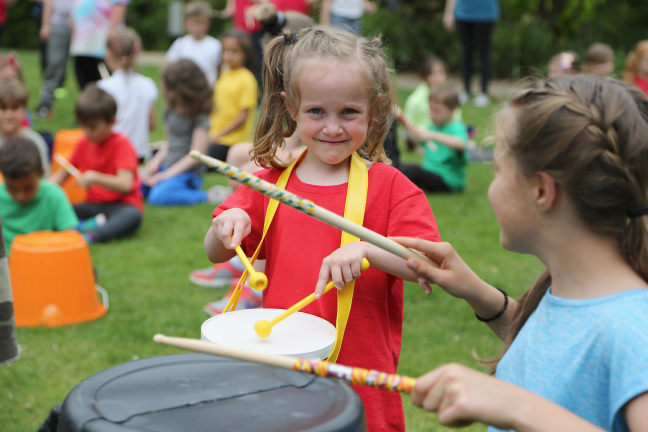
At Dunham Massey, the consequences of the French Revolution would have been in the mind of George Harry Grey, 6th Earl of Stamford and Warrington (1765-1845), whilst tradition and the upholding of rank and social status would be things he held dear. As the Lord Lieutenant of Cheshire he was aware of the meetings being held across the country and is known to have held a meeting with his own magistrates to discuss ‘the preservation of public tranquillity’. There is also evidence that whilst he wasn’t in Manchester on 16 August 1819, he was part of the chain of command that sent the Cheshire Yeomanry to St Peter’s Field, Manchester.
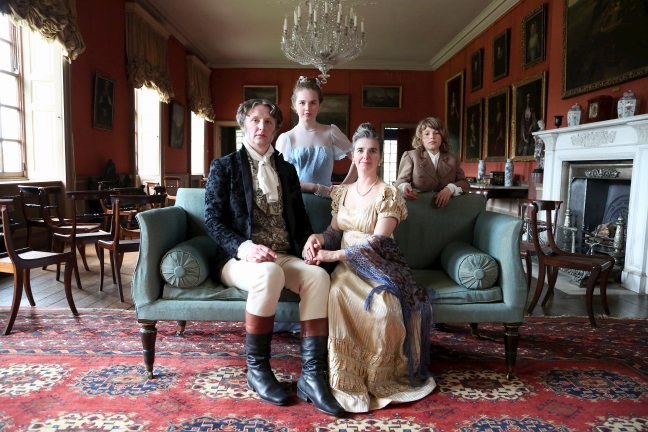
Samuel Greg (1758-1834) and his son Robert Hyde Greg (1795-1875) were present at the Peterloo Massacre. In addition to Quarry Bank, the family had a house on King Street and it is known that Robert was in Manchester on the day of the protest, with the research evidence suggesting that he specifically went to hear Henry Hunt speak. At the trials that would follow he gave evidence that went against the governing view, stating that from where he stood, he could not see people attacking the military, but that it was the military that attacked the people.
The two films portray very different creative approaches, which shift between the real and the imaginary. In the Dunham Massey film the artist family are seen in costume and interact with each other as portraits – hung unexpectedly in the Orangery. The conversations they have as part of the film give an insight into a world illuminated by the volunteers’ research, but with a modern perspective.
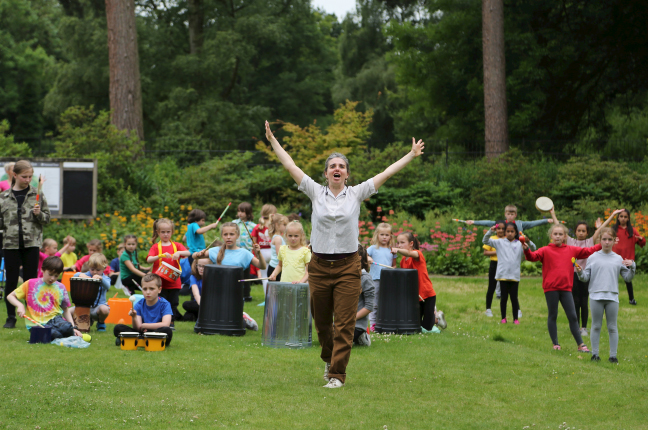
At Quarry Bank it’s the world of communities then and now that feature, with exploration around the notion of protest today and asking the question, what would you protest for? Nine year old Merrick, himself a keen drummer, and the artist family join over 100 children from Styal Primary School to take part in a drumming experience. Taking place in different locations and spaces around Quarry Bank it’s a reminder of collective action, the power and energy of a community of people and marching bands whether protesting at Peterloo or in current times, with all connected by the same rhythm.
Glorious Phantoms will be shown at Dunham Massey and Quarry Bank from Saturday 13 July to 29 September as part of the visitor experience. At Quarry Bank the film features alongside its Rights of the Child exhibition (also until 29 September), which looks at the working lives of Quarry Bank children and what the Peterloo Massacre meant to people in its time, and its significance today.
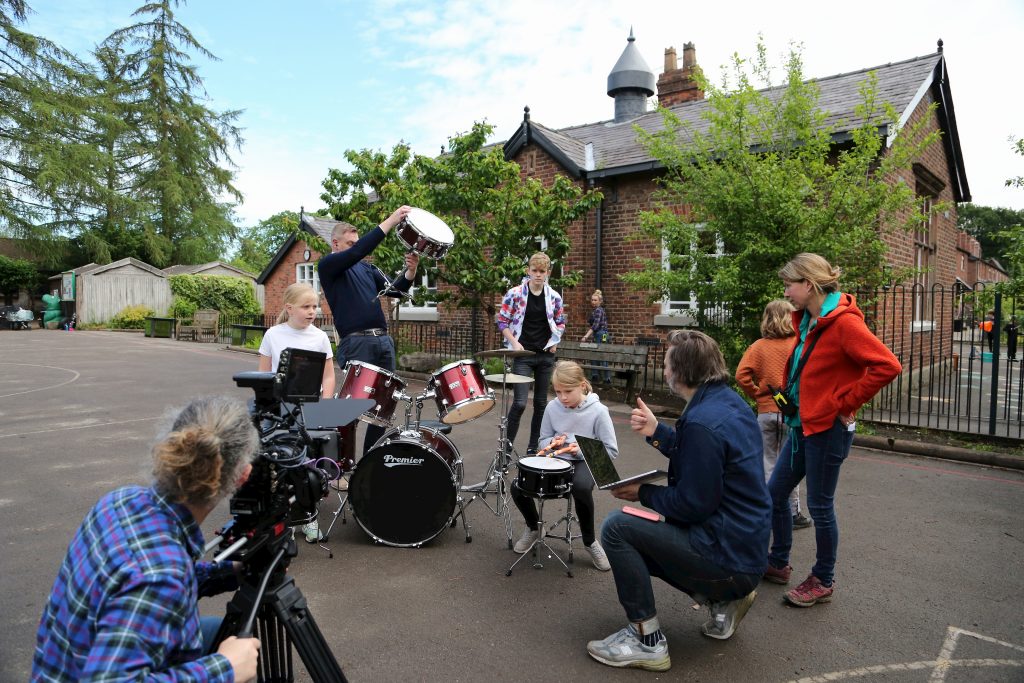
Glorious Phantoms forms part of the Peterloo 2019 programme of events taking place across Greater Manchester this summer to mark the 200th anniversary of the Peterloo Massacre created by cultural organisations, communities and individuals. It is also part of People’s Landscapes, a project through which the National Trust is exploring the connections between its places and significant moments of social and political change.
These commissions are supported using public funding by the National Lottery through Arts Council England and with additional support from Art Fund.
For further information on Glorious Phantoms visit: https://www.nationaltrust.org.uk/features/marking-the-bicentenary-of-the-peterloo-massacre-
Unearthing Passion and Protest exhibition, Manchester Central Library, Saturday 6 July to Saturday 29 September The artistic process that has gone into creating Glorious Phantoms and the research that has been carried out into the Peterloo stories of the two heritage sites has created a rich wealth of materials. These will be on public display at Manchester Central Library in cabinets located outside and inside the reading room, including costumes that have been created to represent the artists, with reference made to the letters, articles and newspapers that have featured in the stories, alongside props from the making of the films and behind the scenes images.

You must be logged in to post a comment Login